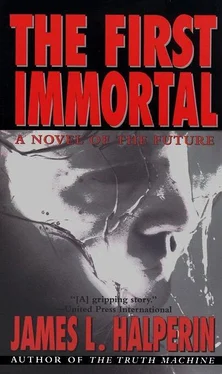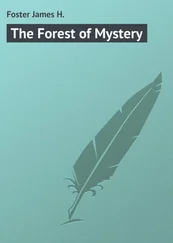Then he gave thanks to a God he would never deny or fathom for the far easier pleasure of forgiving his three daughters, who, although they’d never stopped loving him, had once foolishly abandoned him for dead. Indeed, Ben felt an astonished gratitude that all four of his children were with him tonight, especially Gary.
Finally here, if only in spirit, was Hiro Yamatsuo, whose code of bushido , his blind loyalty to a deified emperor, had cost all semblance of rationality, taking him to the brink of a suicide that even Ben, the colonel’s tormented prisoner, had regarded as too evil a punishment for crimes committed in search of doubtful honor. And now, somehow, through an accidental sequence spanning one and a half centuries, Colonel Yamatsuo had returned the kindness through progeny, when his great-granddaughter Kimber restored to Ben his only son.
Yes, he thought. All of us who arrived too soon upon this Earth have suffered the senseless bondage of Purgatory.
Ben stood, eyes sweeping the room. The legion of his extended family began to rise, and those he loved as blood stood with them. Generation upon generation of Smiths, all alive, all together tonight. Soon many more would join their number. And somehow he knew that he would live to greet them all.
“I stand here before you in celebration of my two hundredth birthday, a thing quite impossible even a few decades ago. Though now the rarest of events, I hope this bicentennial marking of a human birth will soon become noteworthy only in its commonness. And it will, unless we lose sight of who and what we are: human beings, uniquely able to examine the nature of our own existence.”
Ben raised a champagne glass, first to his eyes and then to the full extension of his arm, and spoke words that were his alone to speak:
“This battle is nearly won. All that stand between us and eternal life are fear and gullibility: Dread of the unknown forges faith in the unknowable. Confronted by lost security, we overreact, and too often we self-destruct. But not you, dear ones. Not anymore.
“So what shall we do with our hard-won prize? Consume or build? Slumber or advance? Withdraw into pods or soar through the universe? I cannot speak for the world, but for you gathered here, yes, I would dare.”
Ben Smith tipped his glass toward the assemblage, and each of us felt his salute. “The treasure is yours,” he said. “Now go and live it.”
THE END.
I am forever grateful to the following friends, loved ones, and experts, who either offered ideas for this story, read the manuscript and made suggestions and corrections, or both: Don Bagert, Stephen Bridge, Richard Brodie, John K. Clark, Thomas Donaldson, William Dye, Marc Emory, Robert Ettinger, Robert Freitas, Dr. Abigail Halperin, Audrey Halperin, Edward Halperin, Gayle Ziaks-Halperin, Marjorie Halperin, Duane Hewitt, Penn Jillette, Steve Mayer, Ralph Merkle, Jennifer Miller, Max More, Mike Perry, Will Rossman, Roderick A. Carter-Russell, Brian Shock, Jeffrey Soreff, Andrew Tobias, Paul Wakfer, Brian Wowk, and especially Edward C. Root.
I would also like to acknowledge the following professionals associated with the publishing industry who assisted with this manuscript or were otherwise instrumental in advancing my skills and newfound career: Ellen Archer, Shannon Atlas, Joyce Engelson, Jean Fenton, Joel Gotler, Jerry Gross, Ellen Key Harris, Teri Henry, Milton Kahn, Saul Kent, Timothy Kochuba, Kuo-yu Liang, Richard Marek, Gilbert Perlman, Tammy Richards, Shelly Shapiro, Heather Smith, Pamela Dean Strickler, Scott Travers, and James O. Wade.
You and I enjoy a dubious distinction: Almost certainly, we live among the last few generations of mortal humans. If the human race does not self-destruct, our great-great-grandchildren, grandchildren, or even our children may stave off death long enough to witness the defeat of aging itself. We, however, probably won’t. And once we die it is only a matter of time, and generally not much of it, before we, along with nearly everything we value, are forgotten.
Over the coming century, technological advances will render civilization unrecognizable. In The First Immortal , I have presented an optimistic view of our future, but perhaps not so optimistic as it might seem. Human life has steadily improved, on average, for centuries.
It does seem clear that any twenty-second-century world that cryonically frozen human beings could actually reach would have to possess the spirit, though not the specifics, of the world I’ve drawn. For people to be revived on a wholesale basis, the ultimate value of human life as a philosophical axiom is prerequisite. Any society with such science at its command could have no other reason to revive humans from the ice. But would we accustomed to twentieth-century life enjoy even a “utopian” future?
All change takes getting used to, yet we may have good reason to adapt. Just imagine how today’s civilization would seem to those who had lived five centuries ago. After an initial psychological trauma, former citizens of the 1500s would quickly come to appreciate modern life as miraculous, a place of seemingly unending marvels to absorb. Despite its many problems, our world is an astounding improvement over theirs.
What would it be worth to glimpse, and perhaps inhabit, the world of a century or more from now?
The desire to extend one’s healthy life is not an arrogant wish but a fundamental component of our species’ nature, as intrinsic as the need for air or water. Over the past two years, while researching this novel, I immersed myself in the culture of the cryonicists. I subscribed to their newsletters and e-mail lists, monitored their newsgroups, joined various organizations, and devoured countless books and Web sites on cryonics and nanotechnology. I’ve corresponded with pioneers of cryonics, always trying to keep an open mind. I’ve also listened to and read the often well-reasoned arguments of detractors, skeptics, and cynics. And while I have not become a star-struck true believer, I’ve opened my mind to the realm of the possible and have decided that I am more than willing to gamble a little to save so much.
WILL CRYONICS WORK?
Nature herself proves that repair at the molecular level is possible, but when will such technology become available? That is unknowable, of course, although time is on our side. Liquid nitrogen temperature will hold cells in near-perfect stasis for thousands of years.
As for the standard question about what happens to the soul while one is on ice: If you believe in vitalism, consider the fact mentioned in the text of the story that many humans alive today were once frozen at liquid nitrogen temperature, as embryos. One could hardly call these individuals soulless. Rather, they are convincing evidence that the soul, if it exists, remains with us when frozen.
Half a century ago, most scientists deemed space travel unfeasible, and some contended that the sound barrier would never be broken. Many doctors, forty years ago, considered heart transplants scientifically impossible. Who, even thirty years ago, could have imagined today’s laptop computers, omnipresent cellular phone systems, or the Internet? We have already seen instances of human beings restored to life after up to an hour’s immersion in sub-32°F water, humans who were deceased by any clinical definition. Small organisms have routinely been frozen and revived. It seems naïve to insist that cryonics cannot work simply because no scientific process yet exists to revive deep-frozen adult mammals. By the time medical science possesses the technology to repair freezing damage, we will most likely know how to reverse aging as well, and thus no longer need the stopgap of cryonics.
Читать дальше












